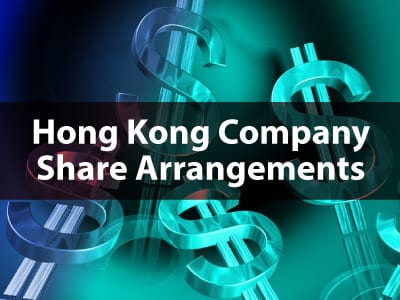This post is also available in:
![]() 繁體中文 (Chinese (Traditional))
繁體中文 (Chinese (Traditional)) ![]() 简体中文 (Chinese (Simplified))
简体中文 (Chinese (Simplified))
Learn All About Hong Kong’s Company Shares and Its Arrangement According to Law
 Private companies that are limited by shares and incorporated in Hong Kong have flexible arrangements for shareholders of the company. Hong Kong’s attractive shareholding arrangement for shareowners management is one of the pull factors for investors to invest in Hong Kong companies.
Private companies that are limited by shares and incorporated in Hong Kong have flexible arrangements for shareholders of the company. Hong Kong’s attractive shareholding arrangement for shareowners management is one of the pull factors for investors to invest in Hong Kong companies.
Hong Kong Company Shares
According to Hong Kong company law, any company can issue shares with agreeable rights noted in the company’s articles of association or terms published for the shares. Usually, a company will issue ordinary shares. But recently, more and more companies are issuing shares with different classes and rights.
Issues With Shares
Shares are usually issued for liability first, then followed by the interest. According to Hong Kong company law, the share capital invested in a company are shares held by shareholders. Rights, obligations and benefits of shareholders must be agreed and prescribed in the company articles of association. The shareholder then becomes a member and owner of the company. A shareholder may have a say in the company, but it depends on the percentage of shares owned.
Powers, Benefits & Obligations
Legally, shareholders have authority in proportion to the shares held in the company.
- For 50% and more shareholding, a shareholder can fire a director and buy over smaller shares owned by small shareholders of the company.
- A 75% shareholder of the company’s share may amend the articles of association, the company name, reduce share capital, allow the company to buy its shares and close down the business.
- A 100% sole shareholder has total power in the company under company regulations.
Shareholders are also entitled to dividend when a company is making profits and voting rights. Sometimes, shareholders may mix and own a different percentage of classes of share to have a different portion of rights. Shareholders are obligated to pay up the share capital when called for, and a sole shareholder must be aware of the company’s commitment at all times.
Categories of Shares
A company may have different classes or types of shares defining the rights to it. The standard types set out by companies are:
- Ordinary shares
Such shares have one voting right, equal dividend payout & same entitlement to company assets surplus after all company winding-up debts paid up. - Preference shares
These shares have no voting rights and have agreed on a fixed amount of dividends paid out of profits. - Defer ordinary shares
Shareholders in this class receive no dividends until other shareholders receive the minimum amount of profits. - Non-voting shares
Usually issued to employees for their remuneration in terms of dividend payouts. - Redeemable shares
Shareholders can sell back their shares to the company at a fixed date or directors discretion, agreeing on a price that is the same or higher. - Management shares
More shares are issued to have more votes to retain better control of the company’s management.

Alter or Converting Shares
Under company law, shareholders are protected from any alteration of shares. Minor shareholders are still at risk if a dominant shareholder can amend the articles of association by passing a special resolution. A similar case for shareholders wanting to convert their shares, an extraordinary decision will require the approval of every shareholder to convert shares.


